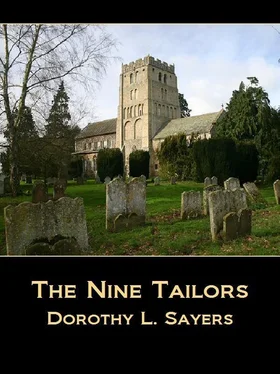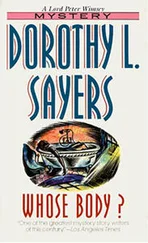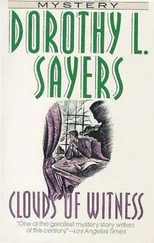Dorothy Sayers - The Nine Tailors
Здесь есть возможность читать онлайн «Dorothy Sayers - The Nine Tailors» весь текст электронной книги совершенно бесплатно (целиком полную версию без сокращений). В некоторых случаях можно слушать аудио, скачать через торрент в формате fb2 и присутствует краткое содержание. Жанр: Классический детектив, на английском языке. Описание произведения, (предисловие) а так же отзывы посетителей доступны на портале библиотеки ЛибКат.
- Название:The Nine Tailors
- Автор:
- Жанр:
- Год:неизвестен
- ISBN:нет данных
- Рейтинг книги:3 / 5. Голосов: 1
-
Избранное:Добавить в избранное
- Отзывы:
-
Ваша оценка:
- 60
- 1
- 2
- 3
- 4
- 5
The Nine Tailors: краткое содержание, описание и аннотация
Предлагаем к чтению аннотацию, описание, краткое содержание или предисловие (зависит от того, что написал сам автор книги «The Nine Tailors»). Если вы не нашли необходимую информацию о книге — напишите в комментариях, мы постараемся отыскать её.
The Nine Tailors — читать онлайн бесплатно полную книгу (весь текст) целиком
Ниже представлен текст книги, разбитый по страницам. Система сохранения места последней прочитанной страницы, позволяет с удобством читать онлайн бесплатно книгу «The Nine Tailors», без необходимости каждый раз заново искать на чём Вы остановились. Поставьте закладку, и сможете в любой момент перейти на страницу, на которой закончили чтение.
Интервал:
Закладка:
“Not at all,” said Wimsey.
“So I fear it must be a case of Hail and Farewell,” continued Mr. Thorpe, firmly. “Delighted to have met you. I could wish that it were under happier circumstances. Ah — good afternoon. Please remember me to your brother when you see him.”
* * *
“Warned off!” said Wimsey, when he had shaken hands with Uncle Edward and bestowed on Hilary Thorpe a grin of understanding sympathy. “Why? Corrupting the morals of youth? Or showing too much zeal about digging up the family mystery? Is Uncle Edward a dark horse or a plain ass, I wonder? Did he go to his brother’s wedding? I must ask Blundell. Where is Blundell? I wonder if he is free to-night?”
He hastened to catch the Superintendent, who bad dutifully attended the funeral, and arranged to run over to Leamholt after dinner. Gradually the congregation melted Mr. Gotobed and his son Dick removed their official “blacks” and fetched the spades that leaned against the wall near the covered well.
As the earth thudded heavily upon the coffin lid, Wimsey joined the small group that had gathered to discuss the ceremony and read the cards upon the wreaths. He stooped idly to examine an exceptionally handsome and exotic floral tribute of pink and purple hothouse exhibits, wondering who could have gone to so much expense for the unknown victim. With a slight shock he read, on a visiting card: “With reverent sympathy. Lord Peter Wimsey. St. Luke xii. 6.”
“Very appropriate,” said his lordship, identifying the text after a little thought (for he had been carefully brought up). “Bunter, you are a great man.”
* * *
“What I really want to know,” said Lord Peter, as he stretched comfortable legs upon the Superintendent’s hearth, “is the relation between Deacon and Cranton. How did they get into touch? Because a lot seems to turn on that.”
“So it does,” agreed Mr. Blundell; “but the trouble is, we have only got their words to go on, and which was the biggest liar, the Lord God only knows, though Mr. Justice Bramhill made a guess. There’s no doubt of one thing, and that is that they knew each other in London. Cranton was one of those smooth-spoken, gentlemanly sort of crooks that you meet hanging about the lounge in cheap-smart restaurants — you know the type. He’d been in trouble before, but he gave out he was a reformed character, and made quite a spot of money writing a book. At least, I suppose somebody wrote it for him, but he had his name put on the cover, and all that. There’ve been several of that sort since the War, but this chap was a smart lad — a bit ahead of his time, really. He was thirty-five in 1914; not educated anything to speak of, but with a kind of natural wit, sharpened by having had to look out for himself, if you take my meaning.”
“Just so. A graduate in the University of the world.”
“That’s very well put,” said Mr. Blundell, welcoming the cliché as an inspiration. “Very cleverly put indeed. Yes — that’s just what he was. Deacon, now, he was different. A very superior man indeed, he was, and a great reader. In fact, the chaplain down at Maidstone said he was quite a remarkable scholar in his way, with a poetic imagination, whatever that may be exactly. Sir Charles Thorpe took quite a fancy to the fellow, treated him friendly and all that, and gave him the run of the library. Well, these two met in some dance place or other, some time in 1912, when Sir Charles was staying in London. Cranton’s story is that some girl that Deacon had picked up — Deacon was always after a skirt — pointed him out to Deacon as the author of this book I was telling you about, and that Deacon made out to be tremendously interested in the book and pumped him a lot about crooks and their doings and the way they worked their little games and all that. He said Deacon made a dead set at him and wouldn’t leave him alone, and was always kind of hinting that he was bound to go back to the old life in the end. Deacon said different. He said that what interested him was the literary side of the business, as he called it. Says he thought, if a crook could write a book and make money, why not a butler? According to him, it was Cranton made a dead set at him, and started pumping him about what sort of place he’d got, and suggesting if there was anything to be pinched, they should pinch it together and go shares, Deacon working the inside part of the job and Cranton seeing to the rest — finding a fence and settling the terms and so on. I daresay it was six of one and half-a-dozen of the other, if you ask me. A pretty pair they were, and no mistake.”
The Superintendent paused to take a long draught of beer from a pewter mug and then resumed. “You understand,” he said, “this was the story they told after we’d got hold of ’em both for the robbery. At first, naturally, they both lied like Ananias and swore they’d never seen each other before in their lives, but when they found what the prosecution had up against them, they changed their tune. But there was this about it. As soon as Cranton realised that the game was up, he adopted this story and stuck to it. In fact, he pleaded guilty at the trial and his one idea seemed to be to get Deacon into trouble and have him gaoled good and hard. He said Deacon had double-crossed him and he was out to get his own back — though whether there was any truth in that, or whether he thought he would get off easy by making himself out to be the poor unfortunate victim of temptation, or whether it was all pure malice, I don’t know. The jury had their own idea about it, and so had the judge.
“Well, now. In April 1914 this wedding of Mr. Henry Thorpe’s came along, and it was pretty well known that Mrs. Wilbraham was going to be there with her emerald necklace. There wasn’t a thief in London that didn’t know all about Mrs. Wilbraham. She’s a sort of cousin of the Thorpes, a lot of times removed, and long way back, and she’s got a stack of money and the meanness of fifty thousand Scotch Jews rolled into one. She’ll be about eighty-six or seven now and getting childish, so I’m told; but in those days she was just eccentric. Funny old lady, stiff as a ramrod, and always dressed in black silks and satins — very old-fashioned — with jewels and bangles and brooches and God knows what stuck all over her. That was one of her crazes, you understand. And another was that she didn’t believe in insurance and she didn’t believe a lot in safes, neither. She had a safe in her town house, naturally, and kept her stuff locked up in it, but I don’t suppose she’d have done that if the safe hadn’t been put in by her husband when he was alive. She was too mean to buy as much as a strong-box for herself, and when she went away on a visit, she preferred to trust to her own wits. Mad as a March hare, she must have been,” said the Superintendent, thoughtfully, “but there! you’d be surprised what a lot of these funny old ladies there are going about loose in the world. And of course, nobody ever liked to say anything to her, because she was disgustingly rich and had the full disposal of her own property. The Thorpes were about the only relations she had in the world, so they invited her to Mr. Henry’s wedding, though it’s my belief they all hated the sight of her. If they hadn’t have asked her, she’d have taken offence, and — well, there! You can’t offend your rich relations, can you?”
Lord Peter, thoughtfully refilled his own beer-mug and said, “Not on any account.”
“Well, then,” pursued the Superintendent, “here’s where Cranton and Deacon tell different tales again. According to Deacon, he got a letter from Cranton as soon as the wedding-day was announced, asking him to come and meet him at Leamholt and discuss some plan for getting hold of the emeralds. According to Cranton, it was Deacon wrote to him. Neither of ’em could produce a scrap of evidence about it, one way or the other, so, there again, you paid your money and you took your choice. But it was proved that they did meet in Leamholt and that Cranton came along the same day to have a look at the house.
Читать дальшеИнтервал:
Закладка:
Похожие книги на «The Nine Tailors»
Представляем Вашему вниманию похожие книги на «The Nine Tailors» списком для выбора. Мы отобрали схожую по названию и смыслу литературу в надежде предоставить читателям больше вариантов отыскать новые, интересные, ещё непрочитанные произведения.
Обсуждение, отзывы о книге «The Nine Tailors» и просто собственные мнения читателей. Оставьте ваши комментарии, напишите, что Вы думаете о произведении, его смысле или главных героях. Укажите что конкретно понравилось, а что нет, и почему Вы так считаете.












